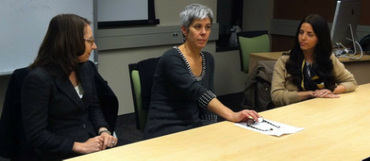 Public relations students are faced with many career options after graduation. Should they pursue a career in agency public relations? Corporate? Nonprofit? At the Oct. 23 PRSSA meeting, public relations professionals Stephanie Jansky, Tami Brown and Abbey Linville participated in a panel discussion to educate members about the different areas of PR. Nonprofit Jansky, Cleveland Clinic’s manager of communications and public affairs, provided insight into the world of nonprofit public relations. More often than not in a small nonprofit organization, there will be no “public relations” job title. It will function under a different umbrella such as fundraising or community involvement, she said. “The risks are lower in nonprofit,” Jansky said. “It’s an easy place to learn because there isn’t as much pressure. You can afford to mess up sometimes.” Brown, general manager of the Greater Cleveland Aquarium, said nonprofit work was worthwhile thanks to the culture of nonprofit organizations and the people working in the industry. “There is so little money and so much that needs to be done,” Brown said. “In nonprofit, you know the people are not there to get rich. They really believe in the mission of the organization.” Corporate Linville, an account executive at Dix & Eaton, said there is a major misconception about corporate public relations: Students think that they will be stuck in one industry for the rest of their careers if they choose to pursue a career in corporate PR. This is simply not true, she said. “If you pick the right company, you may want to stay in that industry,” Linville said. “You can have a lot of diversity in your work. You just have to find the right industry for you.” Jansky agreed. Focusing her career in healthcare public relations, she said that practitioners must have a genuine interest in the corporations for which they’d like to work for. When interviewing candidates for a position, companies can easily see through the facade if an individual tries to fake interest. Agency Agency public relations appeals to professionals who need variety in their work. Linville said a practitioner in agency PR always has a changing schedule. “Working in an agency, there is a lot more flexibility day-to-day,” Linville said. “Sometimes you’re working with a PR person from the client itself, sometimes you’re working with someone else. You rarely get to see the CEO, so it’s a big deal when it happens.” Linville said that most recent graduates pursue a career in agency because it has the most entry-level jobs. “Corporate entry-level jobs usually only guarantee you a year-plus of work,” Linville said. “Agency can be more realistic.” Additional Tips Linville also shared how her career as a public relations student at Kent State prepared her for a career in agency public relations. Her projects, especially in Case Studies and Campaigns, helped her land her first job. “Kent State set me up for everything,” Linville said. “I learned how to network, how to write a résumé. I had to create a LinkedIn profile, and it’s so important in the professional world to keep that updated.” Linville also recommends that students get to know their professors and Campaigns advisors and keep in touch with them after graduation; they can provide guidance on projects or help find new job opportunities. Once a student has found an opening, the professionals offered these tips while interviewing:
Overall, students shouldn’t corner themselves into one area of public relations. “Be flexible,” Brown said. “Keep half of your heart open to other possibilities.”
0 Comments
Leave a Reply. |
Archives
February 2018
|
 RSS Feed
RSS Feed
